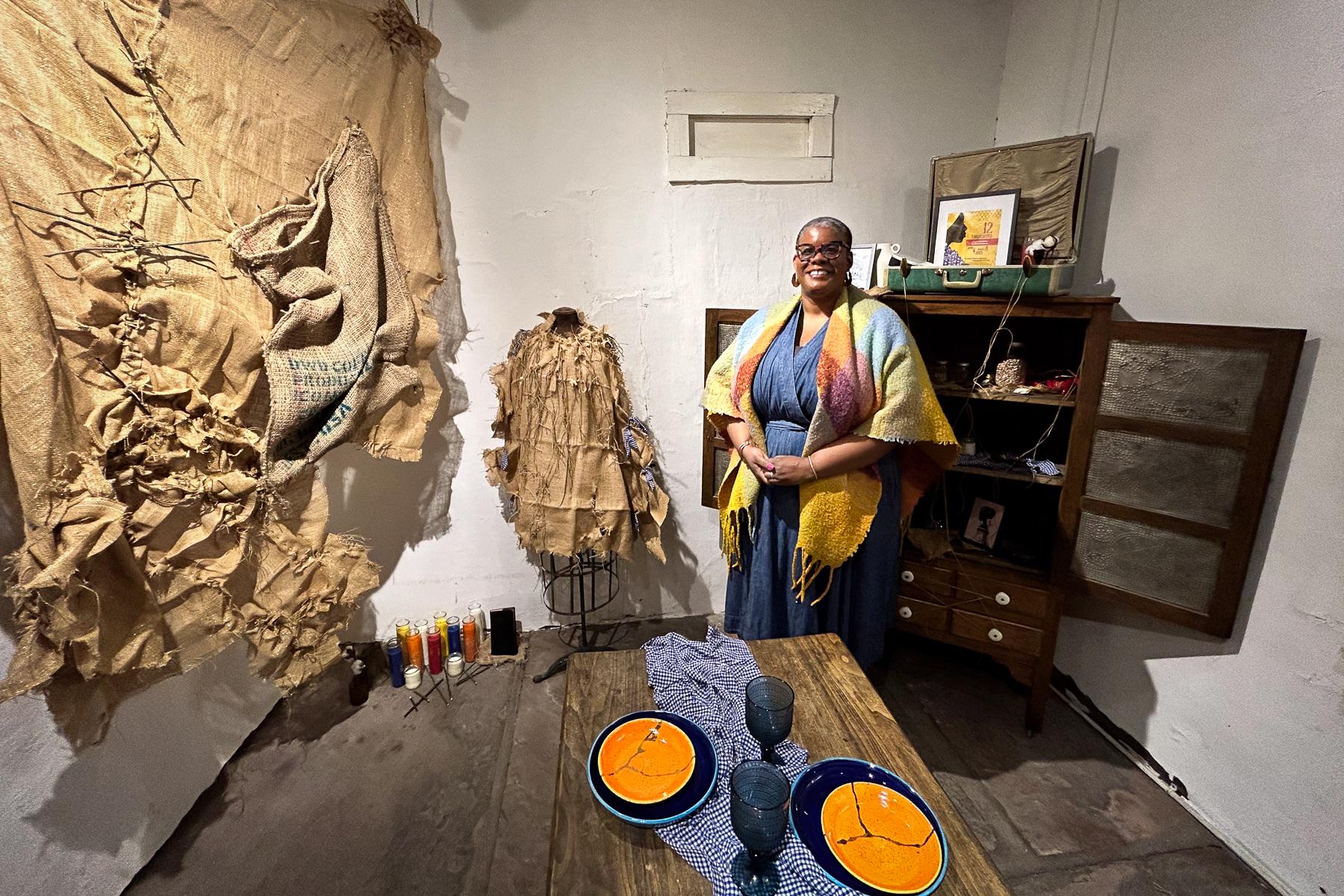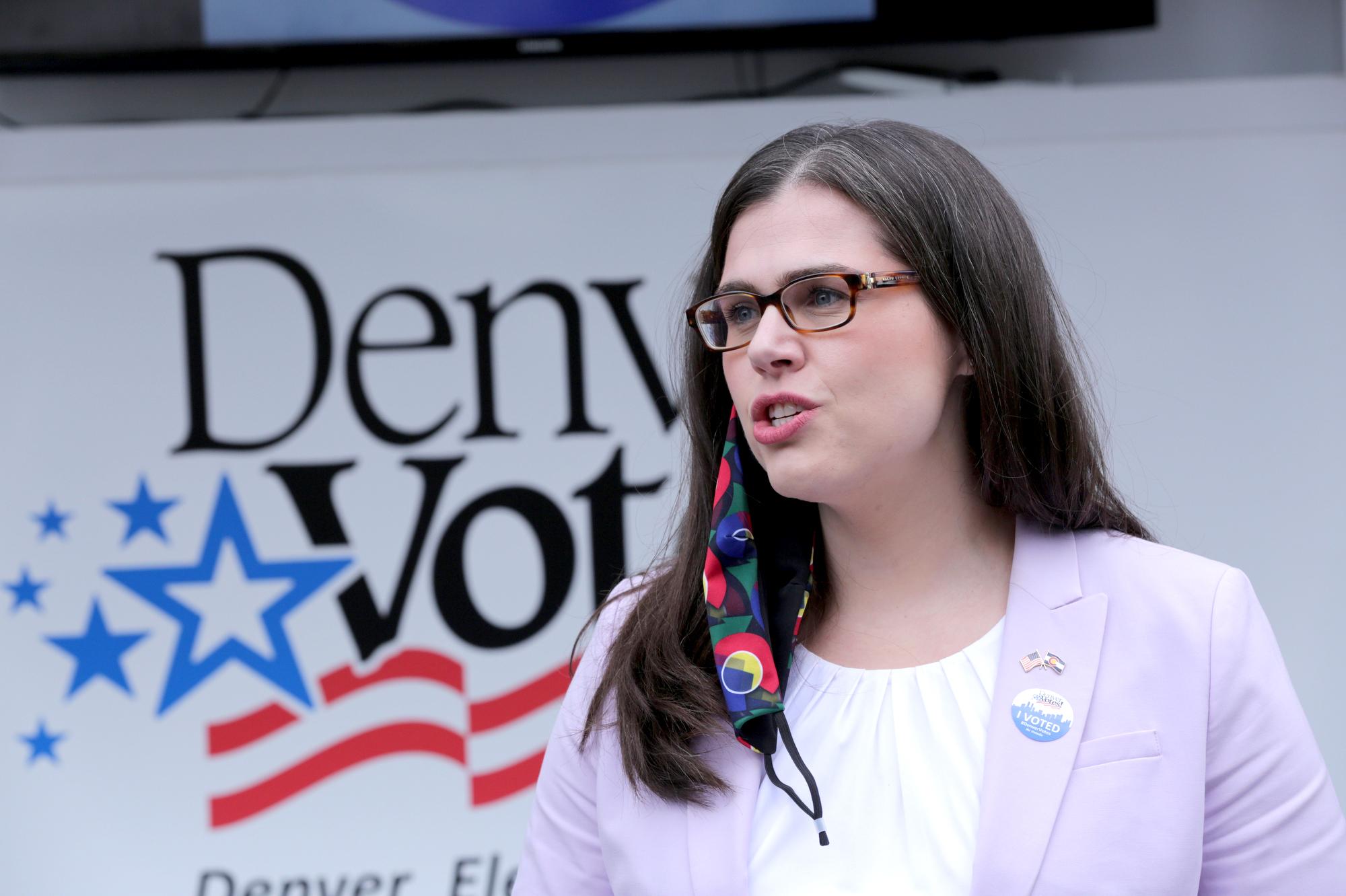
She has feuded with the state’s elections clerks and President Donald Trump while watching the leadership team she hired quit just months into her tenure. Over the objections of the county clerks who run elections, she supported a massive re-write of state elections law, then her office underestimated how much it would cost to implement.
She also oversaw Colorado’s reborn presidential primary, and a second statewide primary that went off with no major problems, while crafting rules to protect voters and election workers in the midst of a pandemic.
Jena Griswold did all that in her first 20 months as Colorado’s secretary of state. She now will oversee her first general election, one with the potential to be the most nationally contentious since 2000. Ballots for that election will be mailed to voters starting Friday, Oct. 9.
Griswold says she, and the state’s election clerks, are ready.
“If you look at other states, our laws are much better and our practices are much better,” Griswold said in an interview. “I'm just really proud of all the work that we have done.”
After winning office over an incumbent Republican in 2018, Griswold, a Democrat and attorney who turns 36 Friday, inherited a voting system and engaged electorate that many other states have tried to emulate.
The secretary of state is often described as Colorado’s top election official, and Griswold’s office is responsible for maintaining the state’s voter registration database and creating rules that govern how ballots are handled and votes are processed. But the actual work of mailing ballots, processing returns and counting votes falls to the state’s county clerks and election directors.
The two — secretary of state and county clerks — typically work in bi-partisan harmony in Colorado. But during Griswold’s brief tenure, that harmony has been tested.
Now, with ballots in the mail and Election Day looming, some clerks are hoping Griswold will turn her focus away from hot-button national controversies and toward overseeing a successful Colorado election.
“I just would hope things could just not be politicized until we get through this election and try to regroup,” said Lori Mitchell, the Chaffee County Clerk and Recorder. “Can everybody just put their head down, do the work, make this a successful election for all the 64 counties, concentrate on our state and not these national conversations? I think we’d all be better off.”
National appearances, Colorado frustrations
It was mid-April 2020, about 15 months into Griswold’s tenure, and local election officials in Colorado were fed up.
It started when Griswold supported 2019 legislation, driven by voter advocacy groups, that required clerks to open more in-person voting options and provide more drop boxes. It was expensive, and unsupported by the state’s clerks, many of whom thought the changes were unnecessary. After that, Griswold frustrated clerks by surprising them with a requirement to change the way they print ballots.
Then this April, the clerks were left without guidance from the secretary’s office about COVID-19.
It’s in that environment that Broomfield City and County Clerk Jennifer Robinson emailed her election director, Todd Davidson, asking if he was going to listen to a virtual town hall Griswold was hosting with New Era Colorado, a progressive voter group.
“Of course,” wrote Davidson on April 15. “I'm p------ myself with excitement to hear her bull---- us some more.”
About a month later Griswold’s office released new COVID-19 guidance. “For once she didn't screw up,” wrote Davidson.
Robinson wrote back: “There’s a first time for everything!”
The exchanges are emblematic of the frustration that local elections officials, both Democrats and Republicans, across Colorado have felt under a secretary of state who had no prior experience in overseeing elections.
After CPR News requested these email records, Broomfield officials called a meeting to discuss what was in them. The meeting, on Sept. 10, included the Broomfield City Manager, Jennifer Hoffman, Robinson and Davidson. Davidson offered an explanation for why he was frustrated in the emails.
“It was right at the height of COVID,” he explained. “And we had requested, frequently, information from (Griswold’s) office. And instead, she was doing campaign events with partisan groups. But it doesn't excuse what I wrote.”

Davidson said he could not comment to CPR News.
Robinson said: “I apologize for making the comment that I made, it was unprofessional and it won’t happen again.”
The frustration was in part because of the turnover and turmoil inside the Secretary’s office. In less than two years in office, Griswold ran through her first handpicked leadership team — all of whom resigned within 13 months — while at the same time becoming the go-to critic of President Donald Trump’s attacks on mail ballots for national media outlets.
Those appearances contribute to Colorado clerks and their staffs questioning Griswold’s aggressive politicization of an office that, while occupied almost exclusively by elected Republicans over the years, has with few exceptions, operated in non-partisan fashion for most of the state’s recent history.
When former Secretary of State Gigi Dennis drafted rules that might have limited union donations in political campaigns, The Denver Post excoriated her in a series of editorials saying, “Gigi Dennis needs to take off her Republican Party badge and provide neutral supervision of the 2006 election campaign.”
The expectation of non-partisanship was again emphasized when former Secretary of State Scott Gessler was found to have “breached the public trust for private gain” by the state Ethics Commission in 2013 after he used state funds to attend a meeting of Republican lawyers.
Griswold has not been accused of violating ethics rules or using state funds for partisan purposes, but she has been vocal, and public, in her criticism of Trump, a candidate on the ballot she is now overseeing.
Griswold, who made 15 appearances on CNN and MSNBC in August alone, explained her willingness to go national and spar with Republicans by pointing to the Washington Post motto “Democracy dies in Darkness.”
“I will always push back against what I see as undemocratic, very troubling tactics, and that would be true, whether it was a Democratic president or a Republican president,” Griswold said.
Not every clerk takes issue with her media appearances. “I don't think that the secretary of any party should stop from using the platform he or she has, because they just simply have the biggest bully pulpit,” said George Stern, a Democrat and the clerk and recorder in Jefferson County.
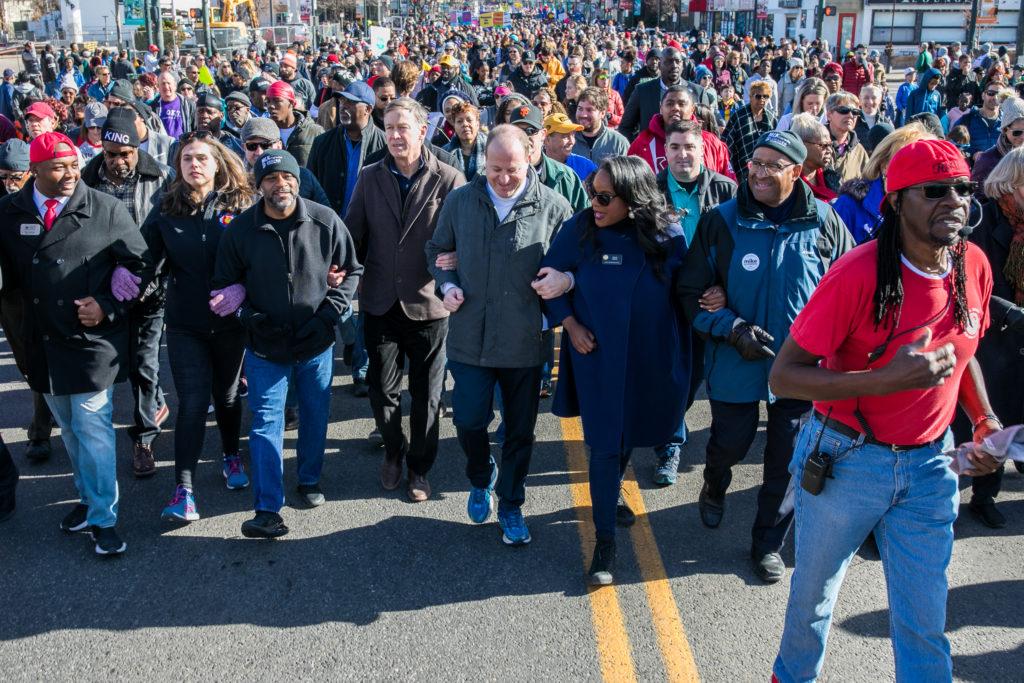
But the view heard most frequently by CPR News was articulated by Lori Mitchell, a Democrat and the Chaffee County Clerk and Recorder: “I do feel that the office is being politicized, and I don't agree with that.”
Griswold’s frequent media appearances and tweeting at President Donald Trump can reduce confidence in the non-partisan management of elections voters expect, Mitchell said.
“I don't know why she does these things,” Mitchell said. “It would almost seem that she's just looking for her next position and not really in it to win it as the secretary. And that's disturbing because we need her leadership now.”
And, Mitchell said, those national appearances by Griswold lead some voters in her area to worry about whether their ballots will be treated fairly, despite no evidence they should be concerned.
“We get bombarded with phone calls,” Mitchell said. “Our constituents are worried or nervous. ‘Are the votes going to count? What does this mean? What does that mean?’”
Colorado has a long track record of running elections safely and efficiently at the county level.
CPR News paid more than $2,500 split almost equally between counties and the Secretary of State's office for thousands of pages of emails related to the conduct of Colorado elections. In those records, and dozens of interviews with local election officials, a theme emerged: It might be better if clerks and the secretary of state found more common ground.
“I've done this for a long time. I've worked with a lot of secretary of states and the relationship between the county clerks and the secretary of state is invaluable,” said Tiffany Parker, the La Plata County Clerk and Recorder, and president of the board of the Colorado County Clerks Association in an interview. “And to have that deterioration at any level is not good.”
Griswold, however, doesn’t see the tension as unusual. “Our office has and continues to do broad outreach to the clerks on all key initiatives,” said Griswold. “Sometimes the clerks association and our office agree. Sometimes we disagree on policy.”
- Automatic Ballot Tracking For Every Colorado Voter
- Voter Turnout In Politically Divided Pueblo May Hinge On A More Personal Campaigning Approach
- The Latino Vote Could Soon Be Key To Political Fortunes In Garfield County
- Everything You Need To Know About Voting, And Mail-In Voting, In Colorado
- Todo lo que necesitas saber sobre cómo votar por correo en Colorado
Griswold suggested that her politics, her gender and her desire to innovate were at work in the difficult early relationship with the clerks and her office staff.
“I am the first Democrat elected in 60 years (as secretary of state) and just the 10th woman ever elected to current statewide office in Colorado's history,” Griswold said. “New leadership brings change, change that can be uncomfortable for some.”
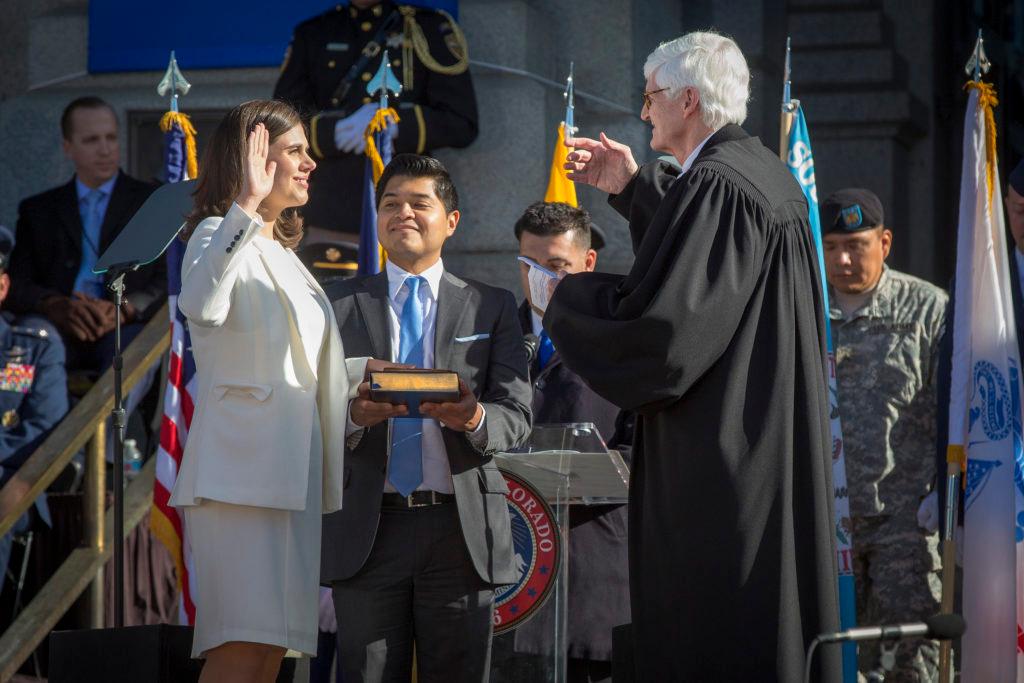
While CPR News found that clerks from both parties, and the association leadership, had concerns about the secretary’s office, not everyone agreed. Adams County and Jefferson County Clerks reported a good working relationship.
“No concerns,” said Josh Zygielbaum, a Democrat and the Adams County Clerk and Recorder. “Secretary Griswold's doing an amazing job. We've seen a lot of movement, a lot of progress in our elections and she's always been supportive, everything we needed especially with pandemic.”
“I've got nothing but good things to say about the staff and the secretary of state's office,” said Stern in Jefferson County.
As this story was being reported, CPR News also received two unsolicited calls from Griswold supporters. One was Gail Schoettler, a former state treasurer who ran against Bill Owens for governor in 1998. Schoettler has been a strong vocal and financial supporter of Griswold’s.
“There's a difference in fairness to men, from fairness to women. And that's why I wanted to talk to you,” said Schoettler, who felt that Griswold, like other powerful women in politics, isn’t treated fairly by the media or her colleagues.
A rocky start
The first complaints about Griswold from clerks were not related to her gender or her politics, but her support of House Bill 1278, a 2019 effort which required clerks to expand drop boxes and polling places, known as Voter Service and Polling Centers or VSPCs.
Griswold’s staff was involved early on in the drafting process with the bill’s sponsors, including Rep. Susan Lontine, D-Denver, but also in close coordination with America Votes, which describes itself as “essential to building progressive power in the states session-by-session and election-by-election.” They were joined by Common Cause, which describes itself as “a nonpartisan, grassroots organization dedicated to upholding the core values of American democracy.”
Left out, apparently, were the state’s 64 clerks.
The bill was intended to address long Election Day lines, which briefly occurred in 2016 in a handful of Metro Denver counties. Those lines were primarily caused by breakdowns in the state’s SCORE computer system, which verifies registration for election day voters, according to county clerks. Other lines in 2018 may have resulted from a long ballot and a surge in last-minute voters.
But the bill, as originally drafted, did nothing to fix SCORE, and, to some clerks, seemed designed to fix election day problems that occur primarily in other states, not Colorado.
“I would say LIGHT THEM ALL UP!! Not just your own!” wrote Pam Bacon, the Logan County Clerk and Recorder, to the rest of the clerks, asking them to call state lawmakers and light up their phones to push back on the bill.
To many clerks of both parties, pushing a bill without the clerks’ support marked a clear departure from the tenure of Wayne Williams, who Griswold defeated in 2018 and who was considered cooperative with county clerks. Williams, a Republican, was a county clerk in El Paso before becoming secretary of state.
“He would have understood, coming from a county clerk's perspective and (knowing) our relationship that we have with our particular communities,” said La Plata Clerk Tiffany Parker. Had he still been secretary of state, “I absolutely agree that this would have looked like a different piece of legislation.”
A flurry of amendments were attached to the bill at the urging of clerks. “Probably the most, I think I've ever seen in my career,” said Parker. One of them requires the secretary of state to improve the SCORE system - but not in time for this year’s Nov. 3 election.
But some clerks in Colorado were still not happy. “That is great news,” writes Patricia Daugherty, the Cheyenne County Clerk & Recorder. “But a total kill of this bill is my dream.”
That didn’t happen. However, through an aggressive lobbying effort, the clerks managed to get the bill to at least pay for itself, with the state kicking in millions of dollars to help expand the voter service centers and dropboxes.
A year later that would prove controversial. Griswold asked the legislature for about $1 million less than necessary for the 2020 presidential primary in part to cover the changes mandated by that bill, forcing several counties to wait months for reimbursement until a complicated budget fix could be made this summer.
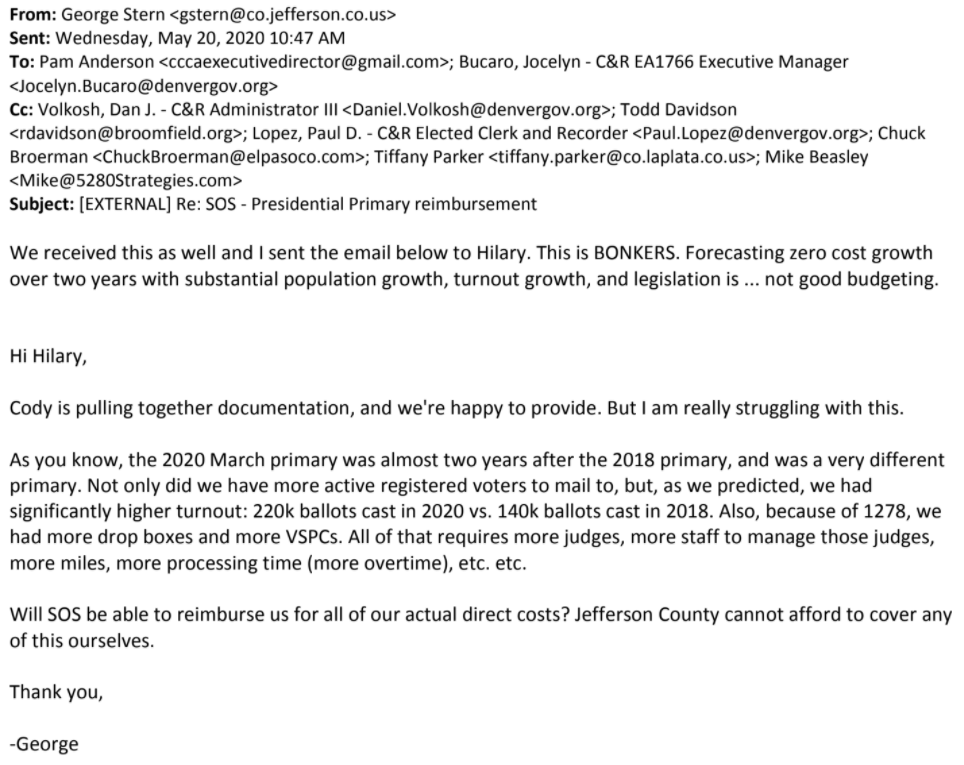
Eyeing higher office
On July 1, less than six months into Griswold’s tenure, the first of her senior staff resigned. Shad Murib, the Government and Public Affairs Director, eventually became a senior advisor to former Gov. John Hickenlooper’s U.S. Senate campaign.
Two weeks later, and just six months into her tenure, Griswold announced she had formed an exploratory committee to run for the U.S. Senate. She raised $207,588 in about a month.
The announcement followed the release of a poll on July 9 by Colorado political consultants that found Griswold as the second most preferred candidate among Democrats to take on incumbent Sen. Cory Gardner. The poll was paid for by Next Senate PAC, whose donors also contributed to Griswold’s exploratory committee.
But on Aug. 9, Griswold announced she would not run after all.
“After some heartfelt deliberation, I have decided that now is not the right time for me to run for the Senate,” she added, citing her ongoing work as secretary of state.
That same month, her senior advisor Ben Schler left the secretary of state’s office. Schler had spent about 10 years in that office, working under four secretaries of state, both Republicans and Democrats. Schler was highly regarded by counties and other elections experts in the office. He would not comment for this story.
COVID-19 and more departures
In November 2019, Melissa Polk, Griswold’s Legal and Policy director left the office after six years serving under multiple secretaries of state. She would not comment for this story.
Her departure, following the resignation of Ben Schler, and followed by the communications director, caused more concern among the counties.
“I adored Ben and Melissa,” said Carly Koppes, the Weld County Clerk and Recorder. “I absolutely did. I worked with them a lot. It's definitely sad that they're not there because we had many long night conversations about elections.”
Koppes and many clerks expressed comfort that, within the elections division of the secretary of state’s office headed by Judd Choate, there is still lots of experience. “Even if there is some lack of experience and knowledge on the upper part of the secretary of state, you still have some really solid people in the secretary of state's office.”
Before Griswold took over last year, the Secretary of State’s office in Colorado was long defined by stability, said Bill Hobbs, the Deputy Secretary of State in Colorado for 13 years, who moved into private practice in 2012. Hobbs served under five different Secretaries from both parties.
“You really need institutional memory and talent, especially in the Secretary of State's office,” said Hobbs. “A lot of the clerks are looking to the secretary of state for expertise.”
And none of the departures were as important to the clerks as that of the Deputy Secretary of State Jenny Flanagan.
Despite coming from Common Cause, often described as a left-leaning organization, but one that bills itself as non-partisan, Flanagan had earned the respect of county clerks from both parties for her vast knowledge of elections.
In an interview with CPR News, Flanagan wouldn’t provide details about why she left the Secretary of State’s office in March of this year. “I can say that I had a really positive experience working as the deputy secretary of state. It was a real honor to serve Coloradans. And my experience at the office was that the team there is just terrific.”
That hues closely to the language agreed upon in a document titled “Jenny Flanagan Talking Points” that accompanied the settlement agreement as “Attachment B”. In the section of the document devoted to what Flanagan will say if asked: “It's been an honor to work with the Secretary and the terrific team at the Department.”
Griswold said of the settlement agreement: “There was a recommendation from the Attorney General's, using boilerplate language, Jenny and I still maintain a good relationship. And I appreciate her leadership on getting through our big 2019 democracy reform package.”
Colorado’s 64 county clerk and recorders felt the loss of Flanagan.
“She totally gets county clerks. She gets what we do. Her and I worked fantastically together, and it was really hard when she left. We were concerned about it because she was our go-to person,” said Parker, who was registered as a Republican before switching to unaffiliated.
As Flanagan was leaving, COVID struck Colorado. Three elections were scheduled over the next eight months, and clerks began developing procedures, in line with their local public health orders.
The March presidential preference primary came and went, with a large turnout and few issues.
Then the secretary of state initiated a new battle. At the end of April Griswold released new draft emergency rules for elections while COVID-19 was still spreading. The rules would lead to weeks of tense back and forth, and at one point local election officials contemplated suing the secretary of state.
A letter dated May 6 from the county clerks laid out the frustrations. For example: “This rule elicited responses like ‘unnecessary’ and ‘beyond reasonable.’”
While the Secretary’s office made some changes in response to the clerk’s concerns, the El Paso County Clerk, for his part, didn’t think it was enough. He sent a letter himself to the Secretary expressing “grave concerns” with the emergency rules.
“I am disappointed that none of our comments were substantively addressed within the rules as adopted,” wrote Chuck Broerman. “I also find the press release that was issued hours after the final promulgation of rules to be disingenuous when it mentioned that your office worked closely with County Clerks and Recorders on its development.”
Broerman didn’t respond to several requests for comment.
The letters were a pointed rebuke to Griswold’s attempt to put additional health and safety rules around elections and presented another friction point in the Clerk/Secretary relationship.
“I would agree,” said Parker, the La Plata Clerk. “And our frustration was the Secretary had to go back three times to rewrite rules because they were deemed illegal. So the frustration was very, very heightened at this time. Some of us had already conducted up to two elections by then.”
But things would get much worse.
It started on the regular calls that clerks were having with Griswold, said Parker. “And as we're working through COVID and trying to figure out the best solutions for voters. We began to feel some frustration.”
On one of those calls, Broomfield Clerk Jennifer Robinson expressed that frustration directly to Griswold. Within hours, Chris Griswold, Jena’s brother, a political consultant for Hilltop Public Solutions, called Robinson’s boss, Pat Quinn, the mayor of Broomfield.
“Chris [Griswold] just made me aware that Jena was concerned about the lack of response from Clerks, one of which was ours,” said Quinn, whose campaign for mayor was managed by Chris Griswold. “And I might have forwarded it onto the city manager. I probably did cause that's my nature.”
The purpose of Chris Griswold’s call to the mayor of the only county in the state with an appointed clerk is unclear, and he did not return multiple calls from CPR News seeking comment. But Jena Griswold said she was unaware he made the call.
Robinson was put on administrative leave after city staff reviewed the emails CPR News had requested, in which they used colorful language referring to Jena Griswold. Last month, Robinson was nearly dismissed before city council voted 6-4 around midnight to keep her in her position just weeks before ballots would be printed.
CPR News wasn’t the only one to request records from Broomfield. A Griswold supporter, Denver lawyer Alex Gano, learned of reporting for this story and went to several Colorado counties seeking the records CPR News had requested.
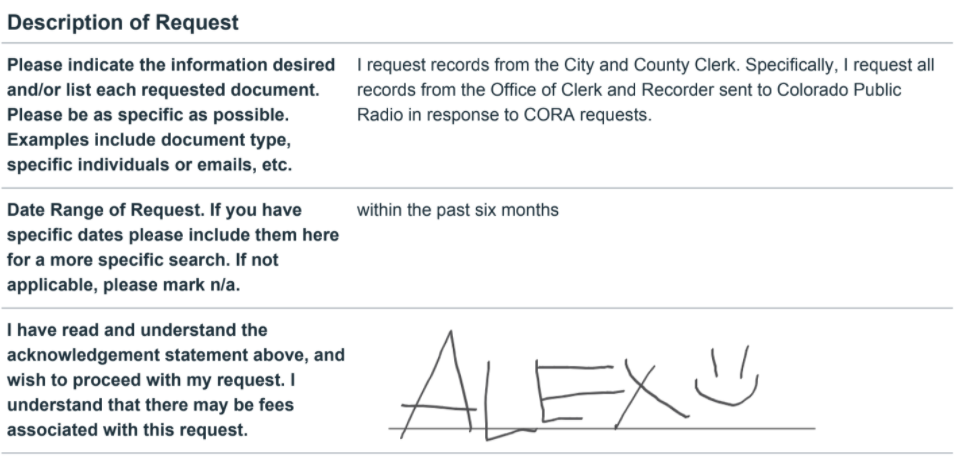
Griswold said she knew Gano.
“I say from our point it's not unusual for records to be requested,” Griswold said. “So I really don't know much more besides that.”
She did not answer a series of questions about whether she retained Gano, or asked him to make the requests of Broomfield and other counties and, if so, what entity, if any, was paying him. Gano, who recently left the law firm Otten Johnson where he wrote blog pieces on housing policy, did not respond to multiple messages from CPR News.
Last week, Griswold made news again, when she tweeted a plea to the news media not to declare a winner of the presidential election until after all ballots were in and counted. That process could take weeks, and the election winner could be apparent long before that from the states that make up a majority of electoral college votes.
Griswold’s tweet made clear that she was concerned the media might aid Donald Trump if he chose to declare himself the winner before all ballots were counted in Democratic-leaning areas. But after she was vilified on social media for her idea and hashtag, #presspause, Griswold backed down.
“My intention was to draw attention to the fact that other states across the nation are drastically adopting new voting procedures,” she wrote in an apology. “And it is critically important that these changes be taken into account in election night reporting.”



